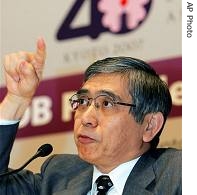2007年VOA标准英语-ADB Promises to Focus on Poor, While Adapting t(在线收听)
Kyoto
07 May 2007
The chief of the Asian Development Bank says the organization will not sacrifice its efforts to help Asia's poor, despite a restructuring effort to offer services to increasingly wealthy nations. The Bank just wrapped up its annual Board of Governors' meeting in Japan, where delegates discussed the organization's future role. VOA Correspondent Kurt Achin reports from the meeting in Kyoto.

ADB President Haruhiko Kuroda answers to questions during a press conference, at Kyoto International Conference Center, 07 May 2007
Asian Development Bank President Haruhiko Kuroda says the organization is not about to forget the reason it was founded.
"We must respond to the changing needs of the region as a regional bank. But that does not mean that the bank can dilute its devotion to poverty reduction," he said.
As he formally closed a four-day meeting of senior ADB officials in Kyoto, Kuroda sought to ease fears about the bank's plans to reinvent itself.
When the ADB was established in 1966, most of Asia was desperately poor and unable to secure capital for badly needed investments.
Forty-one years and billions of dollars in loans later, Asian nations hold a combined $3 trillion in foreign currency reserves. The region is home to export powerhouses like China, Japan, and South Korea.
An ADB report predicted last month that by 2020, most Asians will live in "middle income" countries.
That report sets out a blueprint for the bank in a region less starved for capital. It urges the ADB to take the lead on regional integration, financing infrastructure, and improving the financial sectors of wealthier Asian nations.
The report's recommendations were the focus of an intense series of discussions during the Kyoto conference. Some ADB members are concerned the bank will lose its focus on the poor.
Afghanistan's Finance Minister, Anwar ul-Haq Ahady, said Friday Asia's growth had bypassed his country, and made a plea with the ADB to remain engaged with "fragile states" like his own.
United States delegate Kenneth Reed urged the bank to stick to its core mission and not to seek new mandates.
Indonesian Finance Minister Mulvani Indrawati warned some of the services the ADB hopes to provide to wealthier nations may be better carried out by other organizations.
"This is all becoming the comparative advantage, or strong point, for many other multilateral institutions, say, the World Bank or even the IMF [International Monetary Fund]. So the question is whether the ADB will compete or complement the other two institutions," said Indrawati.
Last month's report predicted that by 2020 absolute poverty, that is, people living on less than $1 a day, would be essentially eradicated in Asia. But ADB President Kuroda pointed out Friday that 60 percent of Asians would still be living on $2 or less per day.
"And can you say that $2 a day is not poverty? I think even $2 a day means still poverty," said Kuroda.
Whichever way the bank is steered, ADB officials say it will certainly contribute to building Asia's infrastructure, which will require hundreds of trillions of dollars in investment in the coming decades. The bank says it will also try to ensure that Asia invests in clean energy projects, and plans to devote a billion dollars of ADB money to that end this year.